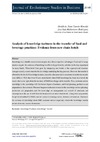Identificador persistente para citar o vincular este elemento:
https://accedacris.ulpgc.es/jspui/handle/10553/56342
| Campo DC | Valor | idioma |
|---|---|---|
| dc.contributor.author | García Almeida, Desiderio J. | en_US |
| dc.contributor.author | Ballesteros-Rodríguez, José L. | en_US |
| dc.date.accessioned | 2019-08-12T16:35:51Z | - |
| dc.date.available | 2019-08-12T16:35:51Z | - |
| dc.date.issued | 2018 | en_US |
| dc.identifier.issn | 2385-7137 | en_US |
| dc.identifier.other | Dialnet | |
| dc.identifier.uri | https://accedacris.ulpgc.es/handle/10553/56342 | - |
| dc.description.abstract | Knowledge is a valuable resource that can provide a firm competitive advantages. Food and beverage practices require the existence of knowledge to effectively perform the activities in this key department for many hotels. When hotel firms grow by integrating new hotels in the organizational structure, managers usually want to transfer the knowledge underlying the key practices. However, the transfer is affected by the level of knowledge tacitness, since this characteristic is considered to render the transfer more difficult. With data from 93 new chain hotels where F&B knowledge has been transferred, the results shed some light about the tacitness of F&B knowledge and its transfer. Thus, customer service knowledge is the knowledge with the lowest degree of tacitness, and food planning, production and preparation is the most tacit. The most frequent mechanism to transfer the knowledge on food planning, production and preparation and the knowledge on management and control of purchases and consumption is the use of staff from the headquarters or other chain hotels in long-term assignments; the preferred method for F&B customer service is training courses, lectures and seminars. Moreover, the tacitness of knowledge about F&B customer service negatively affects the knowledge transfer process in several success dimensions. | en_US |
| dc.language | eng | en_US |
| dc.relation.ispartof | Journal of evolutionary studies in business | en_US |
| dc.source | Journal of evolutionary studies in business [ISSN 2385-7137], v. 3 (1), p. 54-83 | en_US |
| dc.subject | 531290 Economía sectorial: turismo | en_US |
| dc.subject.other | Knowledge tacitness | en_US |
| dc.subject.other | Knowledge transfer | en_US |
| dc.title | Analysis of knowledge tacitness in the transfer of food and beverage practices: Evidence from new chain hotels | en_US |
| dc.type | info:eu-repo/semantics/article | en_US |
| dc.type | Article | en_US |
| dc.identifier.doi | 10.1344/jesb2018.1.j037 | en_US |
| dc.identifier.url | http://dialnet.unirioja.es/servlet/articulo?codigo=6261375 | - |
| dc.description.lastpage | 83 | - |
| dc.identifier.issue | 1 | - |
| dc.description.firstpage | 54 | - |
| dc.relation.volume | 3 | - |
| dc.investigacion | Ciencias Sociales y Jurídicas | en_US |
| dc.type2 | Artículo | en_US |
| dc.contributor.authordialnetid | 212402 | - |
| dc.contributor.authordialnetid | No ID | - |
| dc.identifier.dialnet | 6261375ARTREV | - |
| dc.identifier.ulpgc | Sí | es |
| dc.description.dialnetimpact | 0,0 | |
| dc.description.dialnetq | Q3 | |
| dc.description.dialnetd | D6 | |
| dc.description.erihplus | ERIH PLUS | |
| item.fulltext | Con texto completo | - |
| item.grantfulltext | open | - |
| crisitem.author.dept | GIR Organización y dirección de empresas (Management) | - |
| crisitem.author.dept | Departamento de Economía y Dirección de Empresas | - |
| crisitem.author.dept | GIR IDeTIC: División de Organizaciones, personas y conocimiento | - |
| crisitem.author.dept | IU para el Desarrollo Tecnológico y la Innovación en Comunicaciones (IDeTIC) | - |
| crisitem.author.dept | Departamento de Economía y Dirección de Empresas | - |
| crisitem.author.orcid | 0000-0002-4737-5913 | - |
| crisitem.author.orcid | 0000-0002-3934-2679 | - |
| crisitem.author.parentorg | Departamento de Economía y Dirección de Empresas | - |
| crisitem.author.parentorg | IU para el Desarrollo Tecnológico y la Innovación en Comunicaciones (IDeTIC) | - |
| crisitem.author.fullName | García Almeida, Desiderio Juan | - |
| crisitem.author.fullName | Ballesteros Rodríguez, José Luis | - |
| Colección: | Artículos | |
Los elementos en ULPGC accedaCRIS están protegidos por derechos de autor con todos los derechos reservados, a menos que se indique lo contrario.
